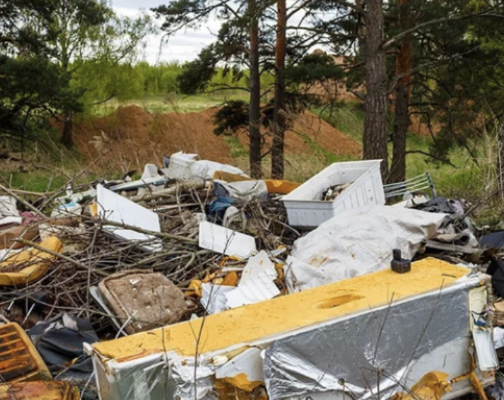Environmental crime is now considered the fourth largest crime worldwide – after drug and human trafficking and product piracy. The European Police Office Europol estimates that every year, illegal profits amounting to hundreds of billions are generated through environmental crime. No concrete figures are available for Germany as yet. However, it is assumed that there is a high number of unreported cases in this country too, as many environmental offences are not detected and reported. Most of the offences reported involve the disposal of illegal waste or the contamination of waterways. According to the German government, these are often organised crimes, as high profit margins are attracted, for example when hazardous waste is disposed of in the natural environment. The investigating authorities and public prosecutors are trying to combat this through better networking and the expansion of their structures.
Waste disposal in open-cast mining
At the beginning of April 2025, the police in North Rhine-Westphalia carried out a large-scale raid against environmental crime. More than 300 investigators were deployed to secure evidence with over 50 search warrants. According to the Dortmund public prosecutor’s office, more than 40 suspects are now under investigation for illegally disposing of tonnes of contaminated soil and waste over a long period of time as part of an organised criminal network, including at the Garzweiler open-cast mine. The disposal was then billed at a high price. The perpetrators are said to have made millions in profits. The investigation focuses on transport companies from the building materials sector and managers of waste disposal companies. ‘This is environmental crime on a large and organised scale. We cannot allow millions to be swindled away here. We must get the money back at all costs,’ commented North Rhine-Westphalia Justice Minister Benjamin Limbach on the case.
Elaborate measurements are required to investigate environmental offences
The Central Office for the Prosecution of Environmental Crime in North Rhine-Westphalia (ZeUK NRW) at the Dortmund Public Prosecutor’s Office, which is leading the investigation into this case of environmental crime, was founded two years ago. Within a very short time, it has become the leading institution in the fight against environmental crime in Germany and Europe. Specialised prosecutors pursue significant cases of organised crime, for example in the areas of illegal waste disposal, water pollution or animal cruelty. They work closely with all state actors. This also includes the state criminal investigation offices. Smooth cooperation with the environmental authorities has a particular impact on effective prosecution, as environmental criminal law relies on administrative assessments and classifications. The evidence includes technical measurements, sampling (soil, water, air), the evaluation of transport and disposal documents and, if necessary, forensic analysis. Special measurement and evidence collection vehicles are also used. This preliminary work results in dossiers on serious environmental crimes that stand up in court and lead to the conviction of the perpetrators.
European environmental legislation
In February 2024, the European Parliament adopted new regulations on environmental crime. They contain an updated list of criminal offences, which now also includes illegal timber trade, depletion of water resources, serious violations of EU chemicals regulations and marine pollution by ships. With the entry into force of this directive, penalties will also be increased. Environmental offences committed by individuals and representatives of companies will be punishable by imprisonment, depending on the duration, severity or reversibility of the damage. Qualified offences will be punishable by eight years’ imprisonment, offences resulting in death by ten years’ imprisonment and other offences by up to five years’ imprisonment. In future, all offenders will have to restore the environment they have damaged and pay compensation. They will also face fines. Depending on the type of offence, fines for companies can amount to up to 3 or 5 per cent of their global annual turnover. These are substantial penalties of between 24 and 40 million euros. Germany plans to implement the EU directive by May 2026. Sanctions will be tightened and environmental controls intensified in waste law, the circular economy and environmental criminal law. Member States can decide whether to prosecute offences that were not committed on their territory. This broadens the focus to include cross-border environmental crime, supply chains and product responsibility.
Environmental protection and combating crime
The Federal Environment Ministry (BMUV) is working with INTERPOL and the World Wide Fund For Nature (WWF) to combat cross-border international environmental crime. The ministry is providing five million euros from the International Climate Initiative for this purpose. The three-year project aims to detect and prevent cross-border crimes with significant harmful effects on the climate, biodiversity and the environment. Cross-border cooperation between law enforcement agencies and the protection of civil society organisations in the detection and prosecution of environmental crimes are to be strengthened during these three years. The participants want to improve cooperation on environmental crime in the areas of fishing, deforestation, mining, pollution and wildlife trafficking. At the launch of the project, the then Federal Environment Minister Steffi Lemke explained the significance of this initiative: “Cross-border organised environmental crime exacerbates the triple planetary crisis – species extinction, climate crisis and littering. It is therefore important to me that environmental protection and crime fighting work closely together. Criminal organisations cause considerable damage to our natural resources: for example, by killing and trading endangered animals, clearing important CO2 reservoirs and habitats such as forest areas, or poisoning landscapes and making them uninhabitable through the illegal dumping of waste.”
©TE (31.10.2025)


